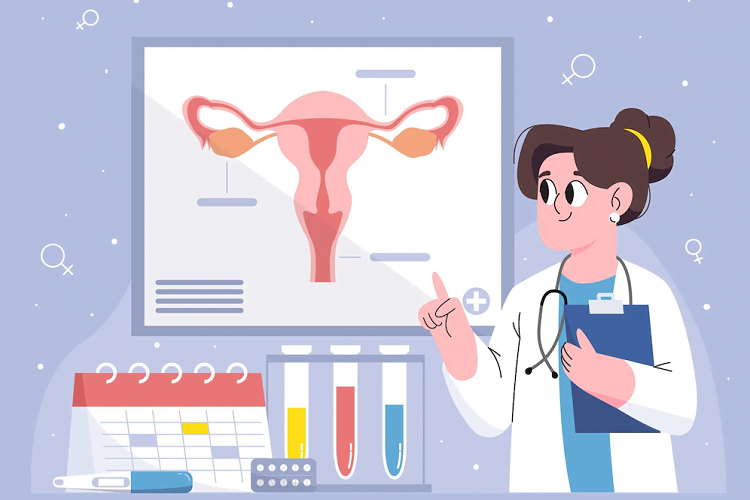PCOD stands for Polycystic Ovarian Disease and PCOS stands for Polycystic Ovarian Syndrome. They are two common, but highly misunderstood conditions affecting women.
During the Christmas about 2 years ago, one of my colleagues was diagnosed with PCOD. When she returned to school & informed us about it, the majority of our replies were along the lines of “PCOD? Wouldn’t that be known as PCOS?” Alternatively: “Wait, what precisely occurs in that? “Simply irregular periods?” And, even worse, “all you require is to lose the weight & follow diet, & everything will be good.”
The ignorance, maybe intentional or otherwise, was obvious – but then, especially at the primary level, that not many understandable materials have been assembled, or they’re not generally available.
Because I am not a qualified medical expert, I decided the absolute least I could do was compile solid material from a few reputable sources to create a very basic and quick guideline.
If you menstruate then you’ve definitely heard about PCOD and PCOS. Your previous knowledge of the two might vary in authenticity based on the context – misconceptions and misinformation abound when it pertains to these unexpectedly prevalent health conditions, and while being completely distinct, the two acronyms are sometimes used incorrectly. Before we talk about how the two vary, let’s first discuss what they consist of – what causes them, how they are treated, and so on.

What is the PCOD issue?
PCOD (Polycystic Ovarian Disease) is a medical disorder that occurs when the woman’s ovaries generate a significant number of immature or partly developed eggs, which develop into cysts inside the ovaries over age. As a result, the ovaries enlarge and emit an excessive quantity of (androgens) male hormones, resulting in infertility, inconsistent menstruation periods, hair loss, & unusual weight intake. PCOD could be managed with dietary and lifestyle changes.
What exactly is PCOS?
PCOS (Polycystic Ovary Syndrome) is a metabolic illness that causes hormonal imbalances in women during their fertile years, that is generally between the age of 12 to 51. Females may skip menstrual cycles, have inconsistent ovulation which makes it difficult to conceive, and experience unusual hair growth mostly on face and rest body, which could also result in diabetes & heart disease in the long run. PCOS is a severe medical disorder that needs immediate medical care or surgical treatment.
What is the root cause of Polycystic Ovarian Disease (PCOD)?
Legacy of the Family
Women who have close female relatives with PCOD have a 50% chance of developing the condition. Because PCOD is responsible for developing diabetes, it may progress to Type 2 diabetes when you become older. However a single gene is still being identified as the source of PCOD, which is believed to be complicated and include numerous genes.
Lifestyle & Insulin resistance
Peripheral insulin resistance affects around 70% of women having PCOD. Your pancreas generates insulin, which is a hormone that aids the body in using sugar from meals for energy. Therefore Insulin resistance prevents cells from adequately using insulin, increasing the body’s requirement for insulin. In order to compensate, Pancreas produces extra insulin.
Insulin Resistance Factors:-
- Insulin resistance caused by hereditary factors
- Overweight causes insulin resistance (related to inactivity & diet)
- A mixture of the two components
Weight
A heavier weight can sometimes increase insulin resistance & the indications of polycystic ovarian syndrome. Several PCOD women say that they have never had complaints like menstruation irregularity or excess hair growth or healthy weight. S uch symptoms develop only when babies acquire weight.
Inflammation
In women, PCOS can cause an extra increase in inflammation. Becoming overweight might also lead to inflammation. Excessive inflammation has been associated to greater androgen levels in PCOD, according to research.
Common PCOD and PCOS Symptoms
The initial symptoms and signs of PCOD generally appear during the very first menstrual cycle of adolescence. PCOD might also occur later in life as a result of weight gain over time.
PCOD manifests itself in a variety of ways. Among the most prevalent symptoms are as follows:
- Androgen levels have risen. Increased male sex hormones can cause a variety of physical symptoms, including excess body and facial hair & male-pattern hair loss.
- Periods that are irregular. Because of an imbalance in egg development, you may experience menstrual irregularities or a disrupted menstrual cycle.
- Difficulty conceiving owing to delayed, irregular or failed ovulation. The body’s hormone imbalance prevents the follicles from developing & releasing the egg, resulting in delayed or unsuccessful ovulation. This has a significant impact on the menstrual cycle &, as a result, your periods. Most women after visiting their doctor came to know about about their inability to conceive due to PCOD.
- Hair loss or severe thinning hair. This symptom is also caused by the body’s higher production of male hormones.
- Skin blemishes
- Gaining weight
PCOS and PCOD Problem Complications
Every woman wonders what happens to her body when she has PCOD or PCOS. Having higher-than-normal androgen levels might have a negative impact on your health. These are the PCOS or PCOD problems that necessitate medical attention:
- Uterine haemorrhage that is not usual
- Infertility or high blood pressure Infertility
- Diabetes mellitus type 2
- Premature labor and delivery
- Syndrome of Metabolic Syndrome (risk for high blood sugar, high blood pressure, heart disease, diabetes, and stroke)
- NASH (Non-alcoholic steatohepatitis) (Non-alcoholic steatohepatitis)
- Despair (Many women end up feeling depression and anxiety due to undesired hair growth and other symptoms)
- Obstructive sleep apnea (More common in women who are overweight, causes repeated pauses in breathing during the night, which interrupt sleep)
- Cancer of the endometrium (Due to thickened uterine lining)
- Miscarriage (spontaneous loss of a pregnancy)
Treatment for PCOD and PCOS
Polycystic ovarian syndrome (PCOS) has numerous treatment options, including:
Birth control tablets can help regulate menstrual periods and alleviate symptoms including acne and undesirable hair growth.
Metformin: This medicine is commonly used to treat type 2 diabetes, but it can also help women with PCOS with insulin resistance and weight reduction.
Hormone therapy may include the use of drugs such as clomiphene citrate or gonadotropins to promote ovulation and increase fertility.
Changes in lifestyle: Losing weight, eating a nutritious diet, and exercising regularly can help improve symptoms and lower the risk of linked health issues including diabetes and heart disease.
Surgery: Ovarian drilling, which involves making tiny holes in the ovaries to limit androgen production, can be utilized in some circumstances.
It is critical to contact with an expert to determine the best treatment approach for your specific situation.
PCOD and PCOS Treatment Options: Medications and Surgery
Polycystic ovarian syndrome can be treated with both medications and surgery (PCOS). Among the medications that might be utilized are:
- Birth control tablets can regulate menstrual periods while also lowering testosterone levels.
- Metformin is a diabetic drug that can assist in the regulation of insulin and glucose levels.
- Clomiphene citrate is a fertility medicine that can aid in ovulation induction.
- Spironolactone is a diuretic that can aid in the reduction of testosterone levels.
- In certain circumstances, surgery, such as laparoscopic ovarian drilling, may be indicated to lower androgen levels and control ovulation. Surgery, on the other hand, is typically only indicated as a last resort after all other treatment options have been exhausted and proved fruitless.
- Working with a healthcare expert to find the best treatment plan for you is critical, as the optimal therapy will differ based on the specific instance.
PCOD and PCOS Treatment Diet
Diet is critical in treating the symptoms of polycystic ovarian syndrome (PCOS). Some dietary suggestions for PCOS management include:
- Consuming plenty of fruits and vegetables, healthy grains, and lean protein.
- Reducing your consumption of processed foods, sugar, and saturated fats.
- Maintaining a healthy weight is important since being overweight or obese can exacerbate PCOS symptoms.
- Consuming reasonable amounts of carbs, since excessive carbohydrate consumption might raise insulin resistance and aggravate PCOS symptoms.
- Furthermore, some research suggests that a low-carbohydrate, high-protein diet may be good for controlling PCOS since it can help manage insulin levels and aid weight reduction.
- It is also critical to consult with a healthcare physician or a nutritionist to develop a diet plan that is suited to your unique requirements and goals.
- It’s also worth noting that, while diet can help control PCOS symptoms, it’s not a cure, and other treatment options, such as medication and surgery, may be required.
How can you get rid of PCOD for good?
PCOD is not a life-threatening condition, but there is no definitive solution. Maintaining a healthy weight, adhering to a complex carbohydrate diet, engaging in regular exercise, and being active will aid in the management of PCOD and its underlying symptoms. It is also essential for females to consult with a gynaecologist and a primary care doctor on a regular basis in order to have a healthy life in the future.


